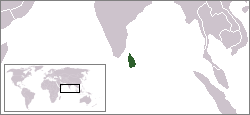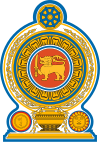
In cultures that practice marital monogamy, bigamy is the act of entering into a marriage with one person while still legally married to another. Bigamy is a crime in most Western countries, and when it occurs in this context often neither the first nor second spouse is aware of the other. In countries that have bigamy laws, consent from a prior spouse makes no difference to the legality of the second marriage, which is usually considered void.
A criminal code is a document which compiles all, or a significant amount of, a particular jurisdiction's criminal law. Typically a criminal code will contain offences which are recognised in the jurisdiction, penalties which might be imposed for these offences and some general provisions.

The Indian Penal Code (IPC) is the official criminal code of India. It is a comprehensive code intended to cover all substantive aspects of criminal law. The code was drafted in 1860 on the recommendations of first law commission of India established in 1834 under the Charter Act of 1833 under the Chairmanship of Lord Thomas Babington Macaulay. It came into force in British India during the early British Raj period in 1862. However, it did not apply automatically in the Princely states, which had their own courts and legal systems until the 1940s. The Code has since been amended several times and is now supplemented by other criminal provisions.
Gun laws in the United States regulate the sale, possession, and use of firearms and ammunition. State laws vary considerably, and are independent of existing federal firearms laws, although they are sometimes broader or more limited in scope than the federal laws.

Suicide is a crime in some parts of the world. However, while suicide has been decriminalized in the western countries, the act is still stigmatized and discouraged. In other contexts, suicide could be utilized as an extreme expression of liberty, as is exemplified by its usage as an expression of devout dissent towards perceived tyranny or injustice which occurred occasionally in cultures like ancient Rome or medieval Japan.
The Pakistan Penal Code, abbreviated as PPC, is a penal code for all offences charged in Pakistan. It was originally prepared by Lord Macaulay with a great consultation in 1860 on the behalf of the Government of India as the Indian Penal Code. After the independence in 1947, Pakistan inherited the same code and subsequently after several amendments by different governments, in Pakistan it is now a mixture of Islamic and English Law. Presently, the Pakistan Penal Code is still in effect and can be amended by the Senate of Pakistan.
The legal age of consent for sexual activity varies by jurisdiction across Asia, from age 12 to 21 years of age. The specific activity engaged in or the gender of its participants can also be affected by the law. Below is a discussion of the various laws dealing with this subject. The highlighted age refers to an age at or above which an individual can engage in unfettered sexual relations with another who is also at or above that age. Other variables, such as homosexual relations or close in age exceptions, may exist, and are noted when relevant, for example in Indonesia.

LGBTIQ rights inSri Lanka have mostly remained repressed since the colonial era. The island's legal framework lacks the concept of judicial review, which means that the supreme court cannot create or repeal law - at the most it can refuse to enforce law.
Bangladesh is part of the common law jurisdiction. It is a member of the Commonwealth of Nations. The legal system of Bangladesh has its roots in the laws of British India. Since independence in 1971, statutory law enacted by the Parliament of Bangladesh has been the primary form of legislation. Judge made law continues to be significant in areas such as constitutional law. Unlike in other common law countries, the Supreme Court of Bangladesh has the power to not only interpret laws made by the parliament, but to also declare them null and void and to enforce fundamental rights of the citizens. The Bangladesh Code includes a compilation of all laws since 1836. The vast majority of Bangladeshi laws are in English. But most laws adopted after 1987 are in Bengali. Family law is intertwined with religious law. Bangladesh has significant international law obligations.
Prostitution in Sri Lanka is illegal, and related activities such as soliciting, procuring, and brothels are outlawed. It is also illegal to traffic persons for prostitution, especially minors. Prostitution is not as widespread in Sri Lanka as in some neighbouring countries. It is estimated that there are 40,000 prostitutes in the country, and nearly half of them operate in Colombo.

The Sri Lanka Customs is a non-ministerial government department, which performs the duties of collecting customs duties and other taxes and levies in Sri Lanka, under the oversight of the Ministry of Finance. The executive responsible is the director general, currently Mrs. P.S.M. Charles, appointed in September 2017.

Deforestation is one of the most serious environmental issues in Sri Lanka. In the 1920s, the island had a 49 percent forest cover but by 2005 this had fallen by approximately 26 percent. Between 1990 and 2000, Sri Lanka lost an average of 26,800 ha of forests per year. This amounts to an average annual deforestation rate of 1.14%. Between 2000 and 2005 the rate accelerated to 1.43% per annum. However, with a long history of policy and laws towards environmental protection, deforestation rates of primary cover have actually decreased 35% since the end of the 1990s thanks to a strong history of conservation measures. The problem of deforestation in Sri Lanka is not as significant in the southern mountainous regions as it is in northern and lowland southern Sri Lanka, largely due to the nature of environmental protection.
Local government is the third and lowest level of government in Sri Lanka – after the central government and provincial councils. The local government bodies are collectively known as local authorities. They are responsible for providing a variety of local public services including roads, sanitation, drains, housing, libraries, public parks and recreational facilities. Local authorities are divided into three different groups: municipal councils, urban councils and divisional councils. As of November 2017 there were 341 local authorities. All local authorities are elected using the mixed electoral system.

Jaffna Municipal Council is the local authority for the city of Jaffna in northern Sri Lanka. JMC is responsible for providing a variety of local public services including roads, sanitation, drains, housing, libraries, public parks and recreational facilities. Established in January 1949 as a successor to Jaffna Urban Council, it currently has 45 members elected using the mixed electoral system.

The Criminal Law (Amendment) Act, 2013 is an Indian legislation passed by the Lok Sabha on 19 March 2013, and by the Rajya Sabha on 21 March 2013, which provides for amendment of Indian Penal Code, Indian Evidence Act, and Code of Criminal Procedure, 1973 on laws related to sexual offences. The Bill received Presidential assent on 2 April 2013 and came into force from 3 April 2013. It was originally an Ordinance promulgated by the President of India, Pranab Mukherjee, on 3 April 2013, in light of the protests in the 2012 Delhi gang rape case.
The Judiciary of Sri Lanka are the civil and criminal courts responsible for the administration of justice in Sri Lanka. The Constitution of Sri Lanka defines courts as independent institutions within the traditional framework of checks and balances. They apply Sri Lankan Law which is an amalgam of English common law, Roman-Dutch civil law and Customary Law; and are established under the Judicature Act No 02 of 1978 of the Parliament of Sri Lanka.
Cannabis in Sri Lanka is legally sold through Ayurveda herbal shops, and can be used for medical and scientific purposes if given a license by the Ministry of Health.

Local elections were held in Sri Lanka on 10 February 2018. 15.7 million Sri Lankans were eligible to elect 8,327 members to 340 local authorities in the country. It was the largest election in Sri Lankan history. This was also the first election under the mixed electoral system where 60% of members were elected using first-past-the-post voting and the remaining 40% through closed list proportional representation.
The history of sexual minorities in Sri Lanka covered in this article dates back to a couple of centuries before the start of the Vikram Samvat era, although it is highly likely that archaeology predating this period exists. There are virtually zero historical records of sexual minorities in the Latin script dating prior to colonialism. The concept of Sri Lanka did not exist prior to colonialism, and the term 'lanka' translates to 'island'.
Article 365 of the Sri Lankan Penal Code criminalizes "carnal intercourse against the order of nature" and provides for a penalty of up to ten years in prison.











